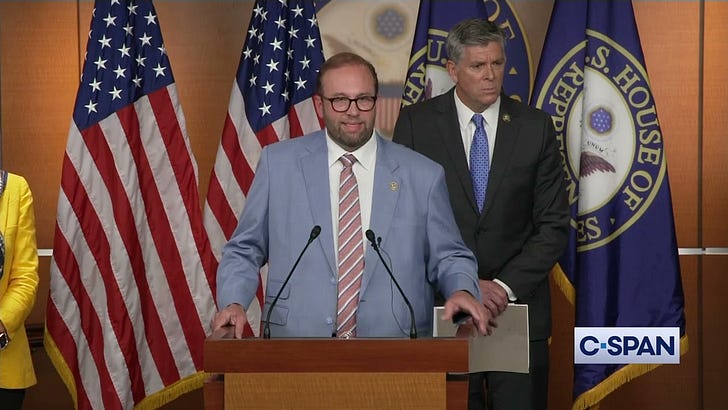An NBC reporter got praise for persistence. Too bad that's rare enough to warrant kudos.
Plus, another false-equivalence headline for your growing collection, and thanks for the writing advice
For almost a full day after NBC News reporter Ryan Nobles refused to let a Republican congressman off the hook during a news conference, the praise flowed in.
Some wished that he had been named the new moderator of “Meet the Press.” Others marveled at how he managed to be polite but relentless with his followup questions.
Nobles was featured on Morning Joe the following day. And a colleague at his own network wrote a news story about the exchange with House Ways and Means Committee chairman Jason Smith. Nobles pressed him about the committee’s investigation into President Biden and allegations of influence peddling.
Ryan wanted to know about the timeline that supposedly proves “evidence of corruption and misconduct” — specifically, how Biden could have been a party to influence peddling when he wasn’t in office or a presidential candidate when a supposedly damning WhatsApp message was sent by his son Hunter Biden.
“Well, I think the facts speak for themselves,” the Missouri congressman responded. But as Nobles pointed out, in this case they don’t. It’s worth watching the exchange here.
No doubt, Nobles did a fine job. But it’s a disgraceful commentary on the norm in which reporters fail to follow up effectively, or to do the detailed preparation which makes such an exchange possible.
On the far less admirable side of things from this week’s media mix, here’s an example of what’s often disparaged as “both-sides” journalism, in which vastly different aspects of a situation are presented as having equal weight.
“Gen. Mark Milley, polarizing Joint Chiefs chairman, exits center stage,” the Washington Post headline read. The sub-headline, or deck, was worse: “Admirers say he helped save American democracy. Critics contend he dragged the military deeper into the country’s toxic political fray.”
The observer who sent this to me nailed the problem: “Yeah, he carefully followed his oath to ‘support and defend the Constitution of the United States against all enemies, foreign and domestic.’ Very polarizing!”
When you see the word “polarizing,” beware. It’s a red flag, these days, for false equivalence. It can be way to avoid identifying what’s really going on with a Republican party that has gone off the rails.
Separately, many thanks to all who offered such good writing and editing advice in the comments of my last post. I shared a lot of it on Wednesday in a workshop with about 25 masters students in Duke’s Sanford School of Public Policy. Thanks to organizers Laura Streitfeld and Anna Hallahan, co-editors in chief of the Sanford Journal. Here’s a post-workshop photo.
Thanks to all subscribers. If you’d like to support this project, please consider upgrading to a paid subscription.
And be on the lookout Wednesday for the next episode of the American Crisis podcast — my interview with Garrett Graff, the political journalist and author of “Watergate: A New History.” His outstanding insight and knowledge opened my eyes to aspects of Watergate and the Trump era. Our conversation changed the way I’m thinking about our perilous moment.







I am looking forward to your interview with Garrett Graff. One of the reasons to study history is to see not just our errors, but to see how we got where we are now. If Ford hadn’t pardoned Nixon would Trump have been so reckless. The imperial presidency grew out of the Nixon era and emboldened all the republicans who followed him because there were no consequences for his transgressive behavior. We can go back further to the red scares to see how demonization of the opposition in the name of American populism was present even in the earliest days of the republic. Trump didn’t spring miraculously from nowhere. He followed the footsteps of those who preceded him.
Good journalism these days seems like that little bit of grass growing out of a crack in the concrete.